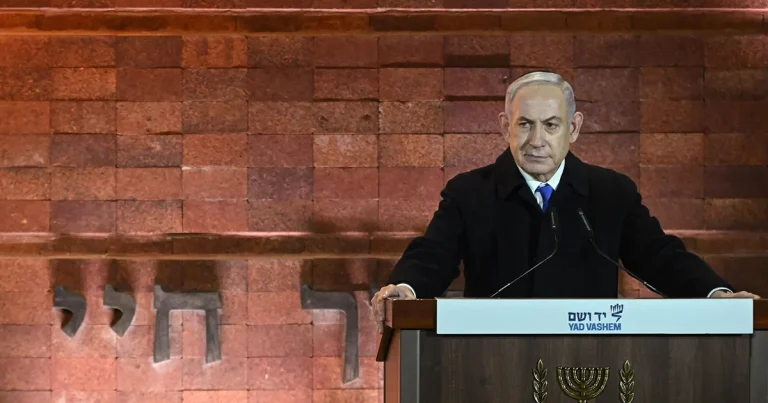20-5-2024 (THE HAGUE) In an unprecedented move, the chief prosecutor of the International Criminal Court (ICC) has revealed that he is pursuing arrest warrants against senior Israeli and Hamas officials for alleged war crimes and crimes against humanity committed during last year’s deadly conflict in Gaza.
Karim Khan stated that his office has submitted applications to the ICC’s pre-trial chamber, seeking the arrests of top military and political figures on both sides implicated in the violence surrounding Hamas’s October 7th assault and the ensuing war.
Among those named are Israeli Prime Minister Benjamin Netanyahu, Defense Minister Yoav Gallant, as well as Hamas leaders Yahya Sinwar, the group’s chief in Gaza, Mohammed Deif, commander of its military wing considered the mastermind behind the October 7th attack, and Ismail Haniyeh, the Qatar-based head of Hamas’s political bureau.
“The world was shocked on October 7th when people were ripped from their homes, from their bedrooms in different kibbutzim…people have suffered enormously,” Khan told CNN on Monday. “We have a variety of evidence to support the applications we’ve submitted to the judges.”
According to the ICC prosecutor’s office, the Israeli leaders stand accused of extermination, deliberately causing starvation as a method of warfare, denying humanitarian relief supplies, and intentionally targeting civilians. Conversely, the Hamas figures are wanted for alleged crimes of extermination, murder, hostage-taking, rape, sexual assault, and torture.
“These acts demand accountability,” the statement from Khan’s office declared.
The move marks an historic first, as the ICC has never before issued arrest warrants for leaders of a “Western-style” democracy, having previously pursued figures like Russia’s Vladimir Putin, Libya’s Muammar Gaddafi, and Ugandan warlord Joseph Kony.
In 2021, the ICC determined it possessed a mandate to investigate violence and alleged war crimes perpetrated by Israel and Palestinian factions dating back to 2014, despite Israel’s non-membership in the court and its refusal to recognize its authority.
Khan had visited the Egyptian side of the Rafah border crossing into Gaza late last October, followed by trips to Israel and the West Bank in December, making clear that his investigation would encompass the events of October 7th and their aftermath.
Israel’s government and much of its public have long maintained that the United Nations and associated bodies harbor an anti-Israel bias. Earlier this month, Prime Minister Netanyahu appeared to panic over the prospect of ICC prosecution, reportedly appealing to ally US President Joe Biden to intervene against any potential legal action targeting Israel.
The issuance of ICC arrest warrants could put Israeli officials at risk of detention when traveling to other countries, exacerbating Israel’s growing international isolation over its conduct during the Gaza war. Approximately 1,200 people, predominantly civilians, lost their lives on October 7th, while the Palestinian Health Ministry estimates some 35,000 fatalities overall from the conflict, though not distinguishing between civilian and combatant deaths.
Concurrently, Israel faces a separate case at the International Court of Justice accused of genocide by South Africa, charges which Israel vehemently denies.
The ICC prosecutor must now submit the requested arrest warrants to a pre-trial panel of three judges, who typically require an average of two months to review the evidence and determine whether proceedings can proceed.
Benny Gantz, a former military chief and member of Israel’s security cabinet alongside Netanyahu and Gallant, criticized Khan’s announcement, asserting that Israel “fights with one of the strictest moral codes” and possesses a robust judicial system capable of investigating itself.




